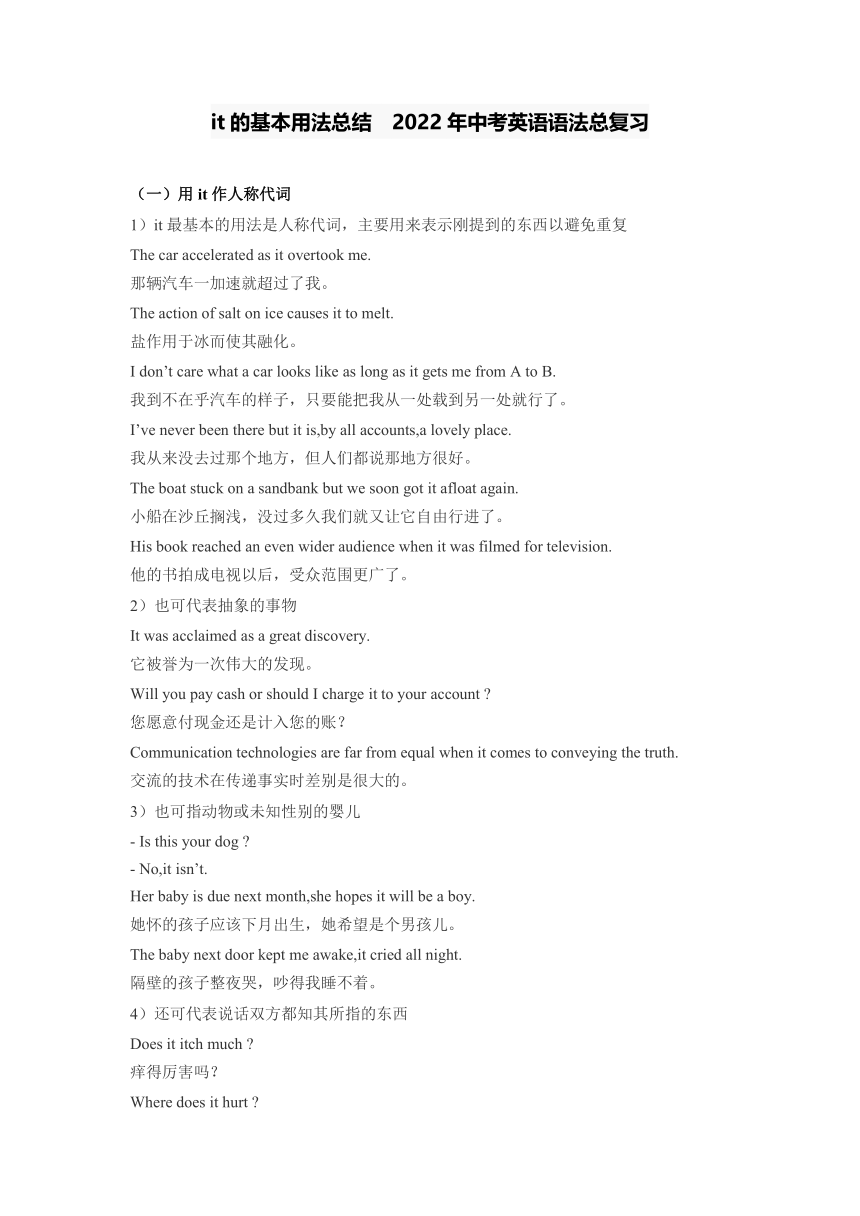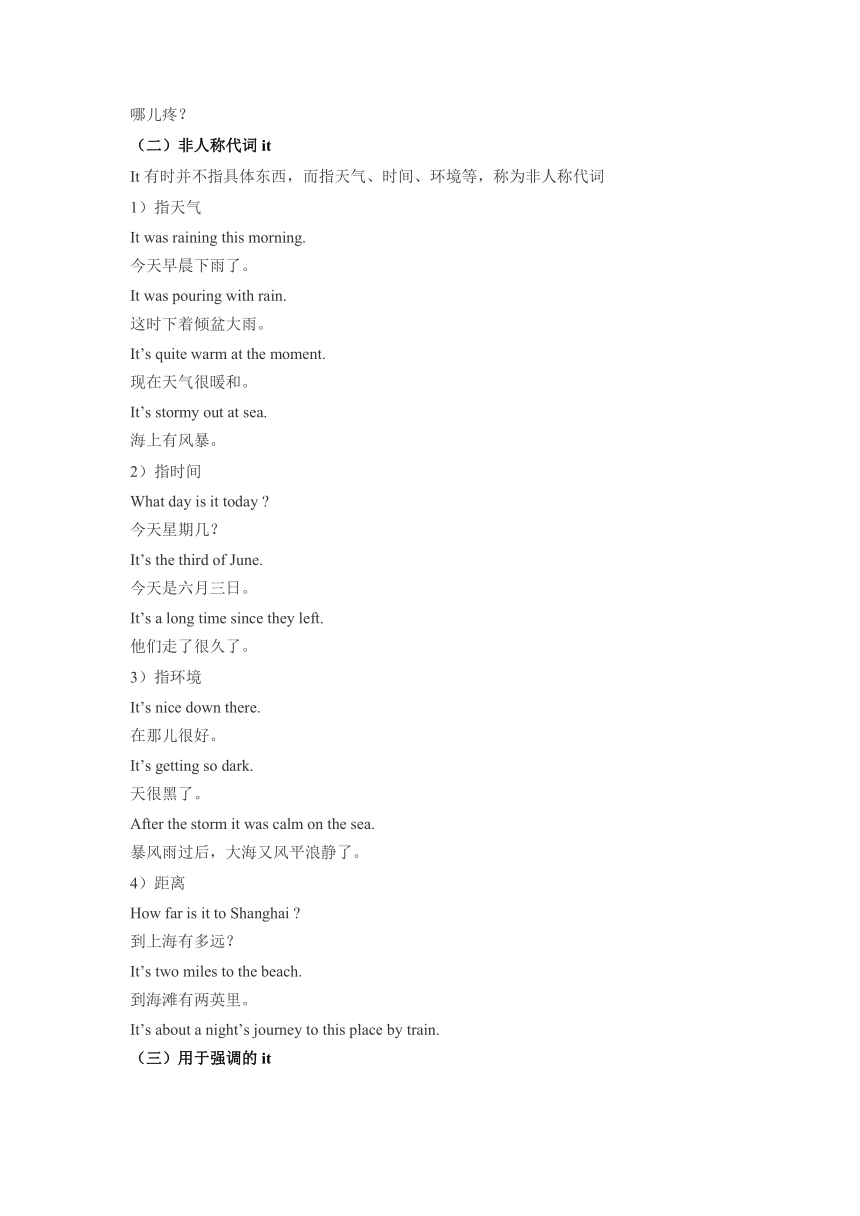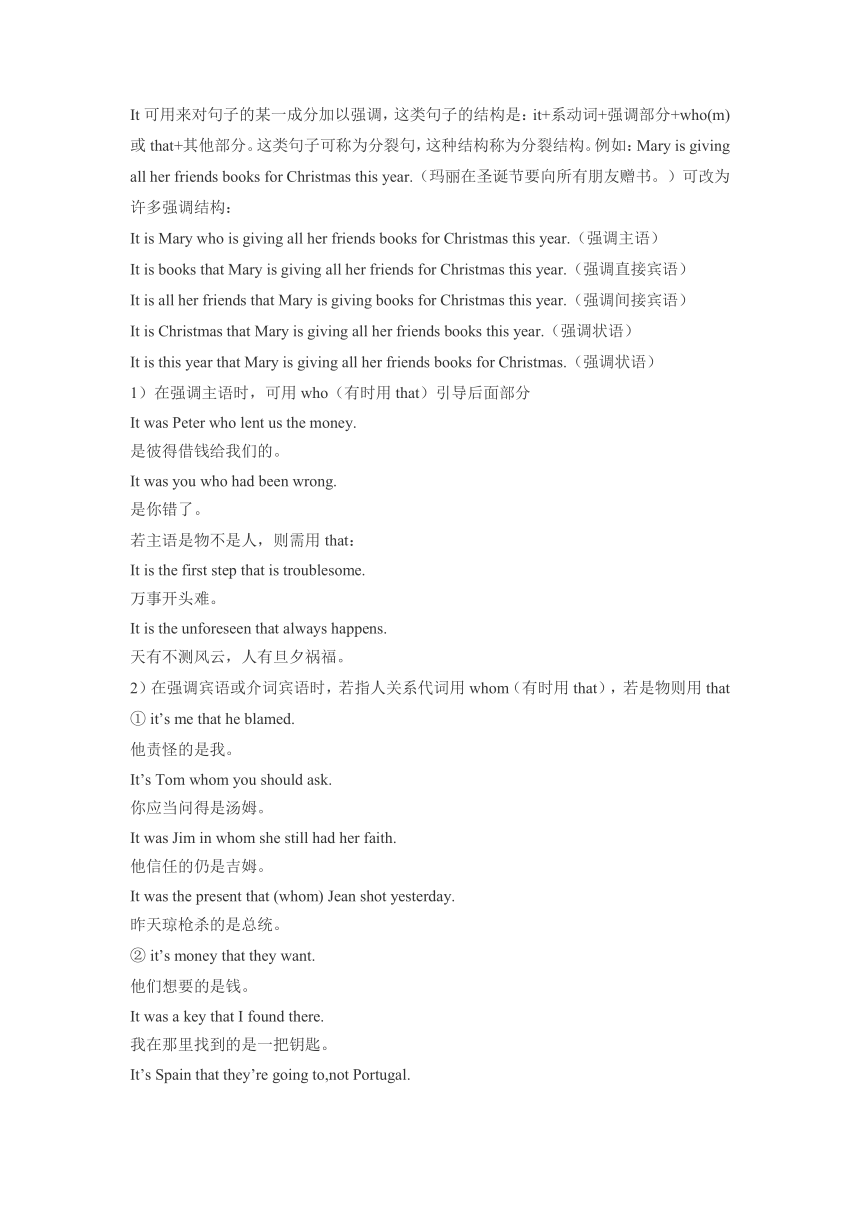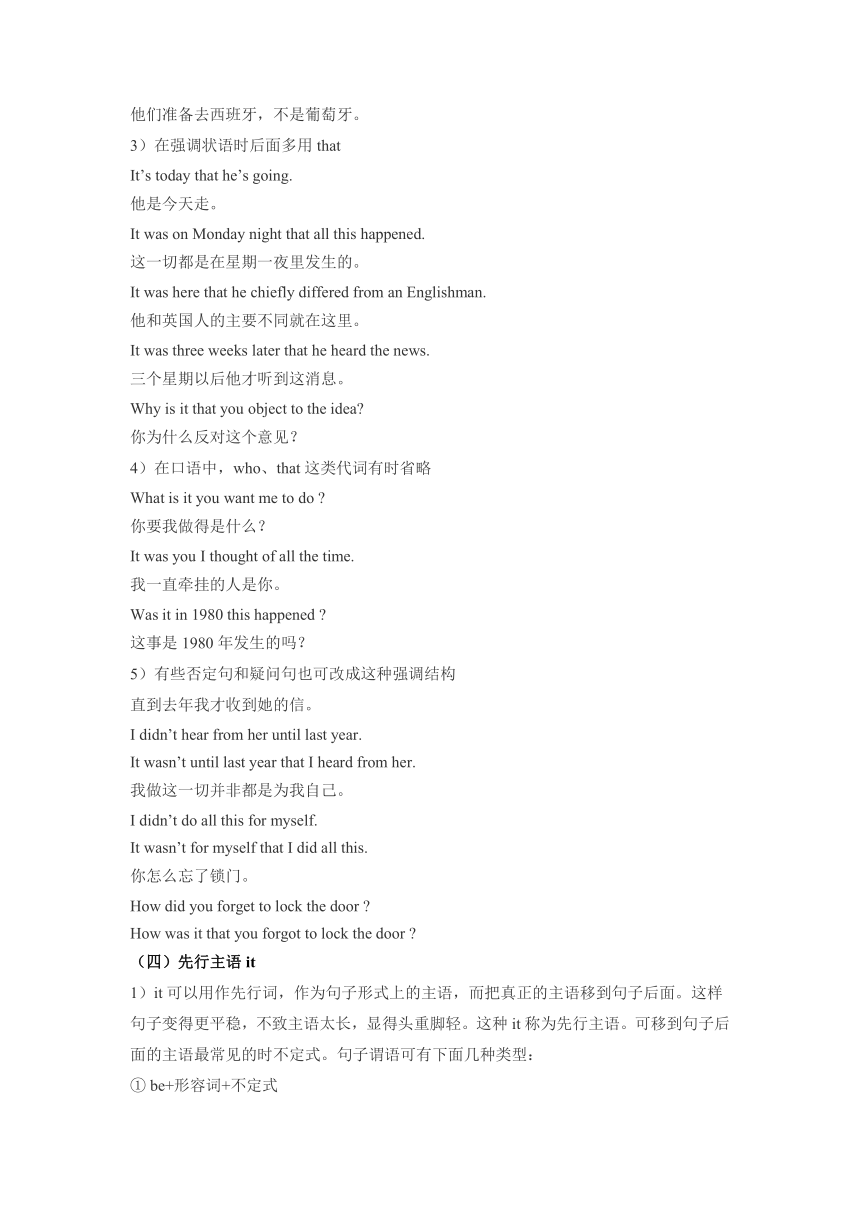2022年中考英语语法总复习it的基本用法总结(word版)
文档属性
| 名称 | 2022年中考英语语法总复习it的基本用法总结(word版) |

|
|
| 格式 | doc | ||
| 文件大小 | 58.5KB | ||
| 资源类型 | 教案 | ||
| 版本资源 | 通用版 | ||
| 科目 | 英语 | ||
| 更新时间 | 2021-12-24 00:00:00 | ||
图片预览




文档简介
it的基本用法总结 2022年中考英语语法总复习
(一)用it作人称代词
1)it最基本的用法是人称代词,主要用来表示刚提到的东西以避免重复
The car accelerated as it overtook me.
那辆汽车一加速就超过了我。
The action of salt on ice causes it to melt.
盐作用于冰而使其融化。
I don’t care what a car looks like as long as it gets me from A to B.
我到不在乎汽车的样子,只要能把我从一处载到另一处就行了。
I’ve never been there but it is,by all accounts,a lovely place.
我从来没去过那个地方,但人们都说那地方很好。
The boat stuck on a sandbank but we soon got it afloat again.
小船在沙丘搁浅,没过多久我们就又让它自由行进了。
His book reached an even wider audience when it was filmed for television.
他的书拍成电视以后,受众范围更广了。
2)也可代表抽象的事物
It was acclaimed as a great discovery.
它被誉为一次伟大的发现。
Will you pay cash or should I charge it to your account
您愿意付现金还是计入您的账?
Communication technologies are far from equal when it comes to conveying the truth.
交流的技术在传递事实时差别是很大的。
3)也可指动物或未知性别的婴儿
- Is this your dog
- No,it isn’t.
Her baby is due next month,she hopes it will be a boy.
她怀的孩子应该下月出生,她希望是个男孩儿。
The baby next door kept me awake,it cried all night.
隔壁的孩子整夜哭,吵得我睡不着。
4)还可代表说话双方都知其所指的东西
Does it itch much
痒得厉害吗?
Where does it hurt
哪儿疼?
(二)非人称代词it
It有时并不指具体东西,而指天气、时间、环境等,称为非人称代词
1)指天气
It was raining this morning.
今天早晨下雨了。
It was pouring with rain.
这时下着倾盆大雨。
It’s quite warm at the moment.
现在天气很暖和。
It’s stormy out at sea.
海上有风暴。
2)指时间
What day is it today
今天星期几?
It’s the third of June.
今天是六月三日。
It’s a long time since they left.
他们走了很久了。
3)指环境
It’s nice down there.
在那儿很好。
It’s getting so dark.
天很黑了。
After the storm it was calm on the sea.
暴风雨过后,大海又风平浪静了。
4)距离
How far is it to Shanghai
到上海有多远?
It’s two miles to the beach.
到海滩有两英里。
It’s about a night’s journey to this place by train.
(三)用于强调的it
It可用来对句子的某一成分加以强调,这类句子的结构是:it+系动词+强调部分+who(m)或that+其他部分。这类句子可称为分裂句,这种结构称为分裂结构。例如:Mary is giving all her friends books for Christmas this year.(玛丽在圣诞节要向所有朋友赠书。)可改为许多强调结构:
It is Mary who is giving all her friends books for Christmas this year.(强调主语)
It is books that Mary is giving all her friends for Christmas this year.(强调直接宾语)
It is all her friends that Mary is giving books for Christmas this year.(强调间接宾语)
It is Christmas that Mary is giving all her friends books this year.(强调状语)
It is this year that Mary is giving all her friends books for Christmas.(强调状语)
1)在强调主语时,可用who(有时用that)引导后面部分
It was Peter who lent us the money.
是彼得借钱给我们的。
It was you who had been wrong.
是你错了。
若主语是物不是人,则需用that:
It is the first step that is troublesome.
万事开头难。
It is the unforeseen that always happens.
天有不测风云,人有旦夕祸福。
2)在强调宾语或介词宾语时,若指人关系代词用whom(有时用that),若是物则用that
① it’s me that he blamed.
他责怪的是我。
It’s Tom whom you should ask.
你应当问得是汤姆。
It was Jim in whom she still had her faith.
他信任的仍是吉姆。
It was the present that (whom) Jean shot yesterday.
昨天琼枪杀的是总统。
② it’s money that they want.
他们想要的是钱。
It was a key that I found there.
我在那里找到的是一把钥匙。
It’s Spain that they’re going to,not Portugal.
他们准备去西班牙,不是葡萄牙。
3)在强调状语时后面多用that
It’s today that he’s going.
他是今天走。
It was on Monday night that all this happened.
这一切都是在星期一夜里发生的。
It was here that he chiefly differed from an Englishman.
他和英国人的主要不同就在这里。
It was three weeks later that he heard the news.
三个星期以后他才听到这消息。
Why is it that you object to the idea
你为什么反对这个意见?
4)在口语中,who、that这类代词有时省略
What is it you want me to do
你要我做得是什么?
It was you I thought of all the time.
我一直牵挂的人是你。
Was it in 1980 this happened
这事是1980年发生的吗?
5)有些否定句和疑问句也可改成这种强调结构
直到去年我才收到她的信。
I didn’t hear from her until last year.
It wasn’t until last year that I heard from her.
我做这一切并非都是为我自己。
I didn’t do all this for myself.
It wasn’t for myself that I did all this.
你怎么忘了锁门。
How did you forget to lock the door
How was it that you forgot to lock the door
(四)先行主语it
1)it可以用作先行词,作为句子形式上的主语,而把真正的主语移到句子后面。这样句子变得更平稳,不致主语太长,显得头重脚轻。这种it称为先行主语。可移到句子后面的主语最常见的时不定式。句子谓语可有下面几种类型:
① be+形容词+不定式
It is never too old to learn.
活到老,学到老。
It may be safer not to advertise your presence.
不把你出席的事声张出去也许更为安全。
It would be unwise to buy the house before having it appraised.
买房不事先估价是不明智的。
It is easy to be wise after the event.
事后诸葛亮好当。
② be+名词+不定式
It’s a privilege to visit your country.
访问贵国是我的一大荣幸。
It was not my habit to ask people for things.
我没有向人索取东西的习惯。
③ be+介词短语+不定式
It was against my principle to do that.
做那样的事有悖我的原则。
It’s beyond me to say why.
我无法说明原因。
It’s not within my power to help them.
我没有力量帮助他们。
④ 及物动词+宾语+不定式
It will take you half an hour to get to the station,allowing for traffic delays.
把路上的耽搁算进去,你要用半小时才能到车站。
It takes three generations to make a gentleman.
十年树木,百年育人。
It takes two to make a quarrel.
一个巴掌拍不响。
不定式前有时可有for引导的短语,表示其逻辑上的主语:
It’s getting harder for a poor man to make a living.
穷人维持生计日益困难。
What time would it be most convenient for me to call again
我什么时候再打电话最方便?
The technological advances make it possible for the middle classes to enjoy what had once been affordable only for the very rich.
技术进步使中产阶级可以享受过去只有富人才能享受得起的东西。
2)用it作先行主语,代表动名词的情况也不少,这类句子用“be+名词”作谓语时最多,也可以“be+形容词”或其他结构作谓语
① it’s no use studying for an exam at the last minute.
临时抱佛脚应考是没用的。
It’s not use crying over spilt milk.
腹水难收。
It’s no good standing in the cold.
在寒风中站着不好。
It’s waste of time talking to him.
和他谈话是白费时间。
② Is it worthwhile quarreling with him
和他吵值得吗?
It’s hopeless trying to convince her.
想说服她是不可能的。
It’s pleasant sitting here.
在这里坐着很愉快。
③ It doesn’t matter waiting a few more days.
再等几天没有关系。
It felt funny being dressed like a boy.
打扮成男孩的样子感觉怪怪的。
(五)it的其他用法
1)人称代词it作宾语
① 人称代词it常可以用作宾语,代表刚提到的一样东西
Burn not your house to rid it of mouse.
不可焚吴驱鼠(勿因小失大)。
You can’t eat your cake and have it.
(谚)鱼与熊掌不可兼得。
② 也可以代表一个婴儿
- How about the baby
宝宝怎么办?
- I’ll take care of it.
我来照看。
③ 也可以表示刚提到的一件事
Yes,I was at home on Sunday.What about it
是啊,我星期天在家,怎么了?
If I can help,I’ll do it.
如果我能帮忙,我一定会这样做。
If he doesn’t come,I can’t help it.
如果他不来我也没有办法。
You promised to support us,you’ve got to do it.
你答应支持我们的,你就应当这样做。I
If I have improved in any way,I owe it all to you.
如果说我有什么进步,那都得归功于你。
You have saved my life,I shall never forget it.
你救过我的命,我永远不会忘记。
2)先行词it作宾语
It也可用作先行宾语,借助它把真正的宾语放在句子后面,特别是用在一些复合宾语中。It可以:
① 代表不定式
He thought it best to be cautious.
他认为最好小心行事。
I’d think it very worthwhile to go.
我认为去是很值得的。
She found it difficult to convince him.
她感到很难让他相信。
He felt it his duty to take good care of them.
他感到好好照顾他们是他的责任。
He made it a rule to do an hour’s work in the garden every day.
他给自己规定每天在花园里干一个小时的活。
② 代表that引导的从句(that有时省略)
I took it for granted (that) you would be coming.
我想当然地认为你会来的。
Depend upon it,we should win the war.
放心吧,我们会打赢这场战争的。
I take it from your silence that you don’t want to go.
从你的沉默中我看出你不想去。
3)代表连接代(副)词引导的从句或动名词
He hasn’t made it clear when he is coming back.
他没有说明他是何时回来。
They haven’t made it known where the meeting is to take place.
他们没有宣布会议在哪里开。
I think it very unwise going on like this.
我认为这样下去很不明智。
4)it可表示“是谁(在某处或做某事)”
It’s Peter on the phone.
是彼得打来的电话。
Was it you who put these books on my desk
是你把这些书放到我桌上的吗?
Her face lighted when she saw who it was.
当她看到是谁时,她的脸上露出喜悦。
5)可以用来泛指某些事
It says here there was a big fire in Soho.
听说Soho中心发生过一场火灾。
It’s getting very competitive in the car industry.
汽车业竞争越来越激烈了。
So you are going to be married this time.When is it
这么说这次你要结婚了,什么时候结?
6)用于指最好的、最渴望得到的或者不平等的事情
He thinks he’s it.
他一直以为自己是最佳人选。
That steak was really it.
那牛排真是不错!
7)一些意义不明确的it
有些作宾语的it,并不指具体的东西,意思很含糊,甚至没有意思
The last train has gone,we will have to foot it.
最后一班火车已经开了,我们得步行了。
You may have to rough it a bit if you come to stay.
如果你来住,你可能要过点苦日子了。
(一)用it作人称代词
1)it最基本的用法是人称代词,主要用来表示刚提到的东西以避免重复
The car accelerated as it overtook me.
那辆汽车一加速就超过了我。
The action of salt on ice causes it to melt.
盐作用于冰而使其融化。
I don’t care what a car looks like as long as it gets me from A to B.
我到不在乎汽车的样子,只要能把我从一处载到另一处就行了。
I’ve never been there but it is,by all accounts,a lovely place.
我从来没去过那个地方,但人们都说那地方很好。
The boat stuck on a sandbank but we soon got it afloat again.
小船在沙丘搁浅,没过多久我们就又让它自由行进了。
His book reached an even wider audience when it was filmed for television.
他的书拍成电视以后,受众范围更广了。
2)也可代表抽象的事物
It was acclaimed as a great discovery.
它被誉为一次伟大的发现。
Will you pay cash or should I charge it to your account
您愿意付现金还是计入您的账?
Communication technologies are far from equal when it comes to conveying the truth.
交流的技术在传递事实时差别是很大的。
3)也可指动物或未知性别的婴儿
- Is this your dog
- No,it isn’t.
Her baby is due next month,she hopes it will be a boy.
她怀的孩子应该下月出生,她希望是个男孩儿。
The baby next door kept me awake,it cried all night.
隔壁的孩子整夜哭,吵得我睡不着。
4)还可代表说话双方都知其所指的东西
Does it itch much
痒得厉害吗?
Where does it hurt
哪儿疼?
(二)非人称代词it
It有时并不指具体东西,而指天气、时间、环境等,称为非人称代词
1)指天气
It was raining this morning.
今天早晨下雨了。
It was pouring with rain.
这时下着倾盆大雨。
It’s quite warm at the moment.
现在天气很暖和。
It’s stormy out at sea.
海上有风暴。
2)指时间
What day is it today
今天星期几?
It’s the third of June.
今天是六月三日。
It’s a long time since they left.
他们走了很久了。
3)指环境
It’s nice down there.
在那儿很好。
It’s getting so dark.
天很黑了。
After the storm it was calm on the sea.
暴风雨过后,大海又风平浪静了。
4)距离
How far is it to Shanghai
到上海有多远?
It’s two miles to the beach.
到海滩有两英里。
It’s about a night’s journey to this place by train.
(三)用于强调的it
It可用来对句子的某一成分加以强调,这类句子的结构是:it+系动词+强调部分+who(m)或that+其他部分。这类句子可称为分裂句,这种结构称为分裂结构。例如:Mary is giving all her friends books for Christmas this year.(玛丽在圣诞节要向所有朋友赠书。)可改为许多强调结构:
It is Mary who is giving all her friends books for Christmas this year.(强调主语)
It is books that Mary is giving all her friends for Christmas this year.(强调直接宾语)
It is all her friends that Mary is giving books for Christmas this year.(强调间接宾语)
It is Christmas that Mary is giving all her friends books this year.(强调状语)
It is this year that Mary is giving all her friends books for Christmas.(强调状语)
1)在强调主语时,可用who(有时用that)引导后面部分
It was Peter who lent us the money.
是彼得借钱给我们的。
It was you who had been wrong.
是你错了。
若主语是物不是人,则需用that:
It is the first step that is troublesome.
万事开头难。
It is the unforeseen that always happens.
天有不测风云,人有旦夕祸福。
2)在强调宾语或介词宾语时,若指人关系代词用whom(有时用that),若是物则用that
① it’s me that he blamed.
他责怪的是我。
It’s Tom whom you should ask.
你应当问得是汤姆。
It was Jim in whom she still had her faith.
他信任的仍是吉姆。
It was the present that (whom) Jean shot yesterday.
昨天琼枪杀的是总统。
② it’s money that they want.
他们想要的是钱。
It was a key that I found there.
我在那里找到的是一把钥匙。
It’s Spain that they’re going to,not Portugal.
他们准备去西班牙,不是葡萄牙。
3)在强调状语时后面多用that
It’s today that he’s going.
他是今天走。
It was on Monday night that all this happened.
这一切都是在星期一夜里发生的。
It was here that he chiefly differed from an Englishman.
他和英国人的主要不同就在这里。
It was three weeks later that he heard the news.
三个星期以后他才听到这消息。
Why is it that you object to the idea
你为什么反对这个意见?
4)在口语中,who、that这类代词有时省略
What is it you want me to do
你要我做得是什么?
It was you I thought of all the time.
我一直牵挂的人是你。
Was it in 1980 this happened
这事是1980年发生的吗?
5)有些否定句和疑问句也可改成这种强调结构
直到去年我才收到她的信。
I didn’t hear from her until last year.
It wasn’t until last year that I heard from her.
我做这一切并非都是为我自己。
I didn’t do all this for myself.
It wasn’t for myself that I did all this.
你怎么忘了锁门。
How did you forget to lock the door
How was it that you forgot to lock the door
(四)先行主语it
1)it可以用作先行词,作为句子形式上的主语,而把真正的主语移到句子后面。这样句子变得更平稳,不致主语太长,显得头重脚轻。这种it称为先行主语。可移到句子后面的主语最常见的时不定式。句子谓语可有下面几种类型:
① be+形容词+不定式
It is never too old to learn.
活到老,学到老。
It may be safer not to advertise your presence.
不把你出席的事声张出去也许更为安全。
It would be unwise to buy the house before having it appraised.
买房不事先估价是不明智的。
It is easy to be wise after the event.
事后诸葛亮好当。
② be+名词+不定式
It’s a privilege to visit your country.
访问贵国是我的一大荣幸。
It was not my habit to ask people for things.
我没有向人索取东西的习惯。
③ be+介词短语+不定式
It was against my principle to do that.
做那样的事有悖我的原则。
It’s beyond me to say why.
我无法说明原因。
It’s not within my power to help them.
我没有力量帮助他们。
④ 及物动词+宾语+不定式
It will take you half an hour to get to the station,allowing for traffic delays.
把路上的耽搁算进去,你要用半小时才能到车站。
It takes three generations to make a gentleman.
十年树木,百年育人。
It takes two to make a quarrel.
一个巴掌拍不响。
不定式前有时可有for引导的短语,表示其逻辑上的主语:
It’s getting harder for a poor man to make a living.
穷人维持生计日益困难。
What time would it be most convenient for me to call again
我什么时候再打电话最方便?
The technological advances make it possible for the middle classes to enjoy what had once been affordable only for the very rich.
技术进步使中产阶级可以享受过去只有富人才能享受得起的东西。
2)用it作先行主语,代表动名词的情况也不少,这类句子用“be+名词”作谓语时最多,也可以“be+形容词”或其他结构作谓语
① it’s no use studying for an exam at the last minute.
临时抱佛脚应考是没用的。
It’s not use crying over spilt milk.
腹水难收。
It’s no good standing in the cold.
在寒风中站着不好。
It’s waste of time talking to him.
和他谈话是白费时间。
② Is it worthwhile quarreling with him
和他吵值得吗?
It’s hopeless trying to convince her.
想说服她是不可能的。
It’s pleasant sitting here.
在这里坐着很愉快。
③ It doesn’t matter waiting a few more days.
再等几天没有关系。
It felt funny being dressed like a boy.
打扮成男孩的样子感觉怪怪的。
(五)it的其他用法
1)人称代词it作宾语
① 人称代词it常可以用作宾语,代表刚提到的一样东西
Burn not your house to rid it of mouse.
不可焚吴驱鼠(勿因小失大)。
You can’t eat your cake and have it.
(谚)鱼与熊掌不可兼得。
② 也可以代表一个婴儿
- How about the baby
宝宝怎么办?
- I’ll take care of it.
我来照看。
③ 也可以表示刚提到的一件事
Yes,I was at home on Sunday.What about it
是啊,我星期天在家,怎么了?
If I can help,I’ll do it.
如果我能帮忙,我一定会这样做。
If he doesn’t come,I can’t help it.
如果他不来我也没有办法。
You promised to support us,you’ve got to do it.
你答应支持我们的,你就应当这样做。I
If I have improved in any way,I owe it all to you.
如果说我有什么进步,那都得归功于你。
You have saved my life,I shall never forget it.
你救过我的命,我永远不会忘记。
2)先行词it作宾语
It也可用作先行宾语,借助它把真正的宾语放在句子后面,特别是用在一些复合宾语中。It可以:
① 代表不定式
He thought it best to be cautious.
他认为最好小心行事。
I’d think it very worthwhile to go.
我认为去是很值得的。
She found it difficult to convince him.
她感到很难让他相信。
He felt it his duty to take good care of them.
他感到好好照顾他们是他的责任。
He made it a rule to do an hour’s work in the garden every day.
他给自己规定每天在花园里干一个小时的活。
② 代表that引导的从句(that有时省略)
I took it for granted (that) you would be coming.
我想当然地认为你会来的。
Depend upon it,we should win the war.
放心吧,我们会打赢这场战争的。
I take it from your silence that you don’t want to go.
从你的沉默中我看出你不想去。
3)代表连接代(副)词引导的从句或动名词
He hasn’t made it clear when he is coming back.
他没有说明他是何时回来。
They haven’t made it known where the meeting is to take place.
他们没有宣布会议在哪里开。
I think it very unwise going on like this.
我认为这样下去很不明智。
4)it可表示“是谁(在某处或做某事)”
It’s Peter on the phone.
是彼得打来的电话。
Was it you who put these books on my desk
是你把这些书放到我桌上的吗?
Her face lighted when she saw who it was.
当她看到是谁时,她的脸上露出喜悦。
5)可以用来泛指某些事
It says here there was a big fire in Soho.
听说Soho中心发生过一场火灾。
It’s getting very competitive in the car industry.
汽车业竞争越来越激烈了。
So you are going to be married this time.When is it
这么说这次你要结婚了,什么时候结?
6)用于指最好的、最渴望得到的或者不平等的事情
He thinks he’s it.
他一直以为自己是最佳人选。
That steak was really it.
那牛排真是不错!
7)一些意义不明确的it
有些作宾语的it,并不指具体的东西,意思很含糊,甚至没有意思
The last train has gone,we will have to foot it.
最后一班火车已经开了,我们得步行了。
You may have to rough it a bit if you come to stay.
如果你来住,你可能要过点苦日子了。
